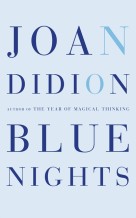If you’re not interested in negotiating the twin griefs of burying a daughter and growing old then forget it. Blue Nights charts them both in a scarifying and cool-eyed way.
As soon as a child is born (or adopted, as was Didion’s daughter Quintana Roo) guilt about failure enters the picture. When the daughter, whom you believe will outlive you, succumbs in adulthood to massive hematoma — just 20 months after the death of her adopted father and your beloved husband — this insult adds to injury.
How much can one frail person bear?
Your own ailments and mental decline add a desperate quality to existence and you could be forgiven, surely, for grasping at straws or words, in this case, the lifeblood of the writer.
Drowning, you try to keep breathing. Flailing, you weary of staying afloat.
Didion’s 2008 memoir The Year of Magical Thinking traced in symphonic detail the nuances of loss and indignities of widowhood that followed the sudden death of her husband John Gregory Dunne by heart attack. She had been married to Dunne for almost 40 years.
Blue Nights, as companion piece, written after her daughter’s death in 2005, is slighter — less operatic, more stranded, more straightforward — and harder in many ways to comprehend.
Didion is right to ask herself the question: What if the problem is cognitive? What if my new inability to summon the right word, the apt thought, the connection that enables the words to make sense, the rhythm, the music itself? What if this new inability is systemic? What if I can never again locate the words that work?
She knows there is alchemy in powerful writing and a source that must be tapped to form the brew. Distress upon distress, in this case, seems to have robbed the brew of its usual potential. But might that be forgivable in this case?
Numbness works as guiding light here and a mechanism through which interested readers will relate to the memoir. The drear is harsh. The fear is harsh. The ache is harsh. The regret is harsh. The vanity is harsh. The remembrance is harsh.
There’s brutality in this work that’s not about magic or, despite its title, about the blues.
Stripped bare of emotion, it stands naked like a winter tree.
Sometimes naked is all you can give and all it takes.




Recent Comments